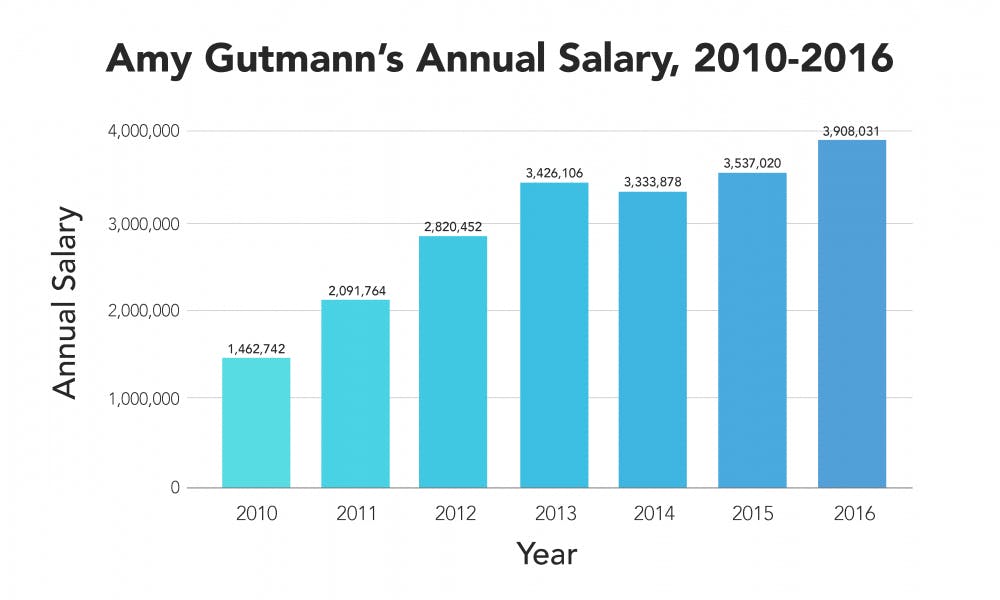
University of Pennsylvania President Amy Gutmann was paid $3.9 million in 2016, according to the most recent report Penn filed with the Internal Revenue Service.
The salary, which is a 10.5 percent increase from her last reported salary of $3.5 million in 2015, makes her among the highest-paid university presidents in the nation.
Gutmann is now the third-highest paid president in the nation and the second highest-earning president in the Ivy League, after Columbia University President Lee C. Bollinger, who earned $3.95 million in 2016. Gutmann's salary recently became available with the release of the University's Form 990 for the 2017 fiscal year.
Penn Board of Trustees Chair David Cohen said Gutmann’s salary has spiked over the years because of her long tenure and performance — namely, the success of both of her fundraising campaigns, the Power of Penn and Making History. Since the beginning of her tenure, Gutmann's salary has climbed 347 percent.
"The Trustees believe that in part because of the complexity of the University, that Amy Gutmann is the best university president in the country,” Cohen said. “We hold the president to a very high level of performance, and Dr. Gutmann has, fortunately for the University, been able to deliver at that very high level of performance."
In June 2018, Penn's endowment reached 13.8 billion, a stunning increase from the endowment's $4 billion valuation when Gutmann took office in 2004.

Gutmann's Making History Campaign brought in more than $4.3 billion — exceeding its initial goal of $3.5 billion dollars — from a total of 326,592 donors. The campaign launched in October 2007 and ended in late 2012.
The Power of Penn campaign is Penn's most ambitious fundraising campaign in history. The campaign, which was announced in April 2018 and is slated to end in 2021, has already raised more than $3.2 billion to date.
Cohen said the president’s salary is formally approved by a compensation committee composed of three trustees he appoints. Cohen added that the consulting firm Korn Ferry aids the compensation committee by providing them with data on other university presidents’ salaries as well as advice on how to structure the salary.
Every year the Board of Trustees asks the president to write a set of goals for the year. At the end of the year, they also ask her to write a self-evaluation of her achievement of these goals. These documents are then given to the compensation committee for review.
In the past several years, university president salaries have risen dramatically. Forbes reported that in 2008, only nine private university presidents made $1 million annually. But in 2016, that number increased to 61 presidents.
Senior Fellow and Director of Leadership Programs at Penn’s Graduate School of Education Peter Eckel said this trend is likely a result of the decreasing candidate pools for University presidents.
“Universities are willing to pay more and more for talent, and are willing to pay a lot more for a lot of talent,” Eckel said. “Some of the [candidate] pools for presidential positions … are also smaller these days, so institutions are willing to do more to lure good talent and to retain good talent."
The Daily Pennsylvanian is an independent, student-run newspaper. Please consider making a donation to support the coverage that shapes the University. Your generosity ensures a future of strong journalism at Penn.
Donate







